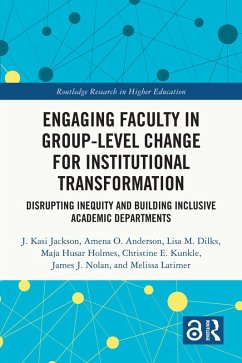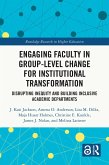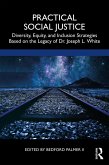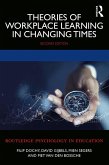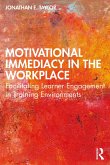J. Kasi Jackson, Amena O. Anderson, Lisa M. Dilks, Maja Husar Holmes, Christine E. Kunkle, James J. Nolan, Melissa Latimer
Engaging Faculty in Group-Level Change for Institutional Transformation (eBook, PDF)
Disrupting Inequity and Building Inclusive Academic Departments
40,95 €
40,95 €
inkl. MwSt.
Sofort per Download lieferbar

20 °P sammeln
40,95 €
Als Download kaufen

40,95 €
inkl. MwSt.
Sofort per Download lieferbar

20 °P sammeln
Jetzt verschenken
Alle Infos zum eBook verschenken
40,95 €
inkl. MwSt.
Sofort per Download lieferbar
Alle Infos zum eBook verschenken

20 °P sammeln
J. Kasi Jackson, Amena O. Anderson, Lisa M. Dilks, Maja Husar Holmes, Christine E. Kunkle, James J. Nolan, Melissa Latimer
Engaging Faculty in Group-Level Change for Institutional Transformation (eBook, PDF)
Disrupting Inequity and Building Inclusive Academic Departments
- Format: PDF
- Merkliste
- Auf die Merkliste
- Bewerten Bewerten
- Teilen
- Produkt teilen
- Produkterinnerung
- Produkterinnerung

Bitte loggen Sie sich zunächst in Ihr Kundenkonto ein oder registrieren Sie sich bei
bücher.de, um das eBook-Abo tolino select nutzen zu können.
Hier können Sie sich einloggen
Hier können Sie sich einloggen
Sie sind bereits eingeloggt. Klicken Sie auf 2. tolino select Abo, um fortzufahren.

Bitte loggen Sie sich zunächst in Ihr Kundenkonto ein oder registrieren Sie sich bei bücher.de, um das eBook-Abo tolino select nutzen zu können.
Diversifying the academic faculty remains an elusive goal marked by slow and uneven progress. This book describes an effective model for institutional transformation which is uniquely grounded in group-level processes.
- Geräte: PC
- mit Kopierschutz
- eBook Hilfe
Andere Kunden interessierten sich auch für
![Engaging Faculty in Group-Level Change for Institutional Transformation (eBook, ePUB) Engaging Faculty in Group-Level Change for Institutional Transformation (eBook, ePUB)]() J. Kasi JacksonEngaging Faculty in Group-Level Change for Institutional Transformation (eBook, ePUB)40,95 €
J. Kasi JacksonEngaging Faculty in Group-Level Change for Institutional Transformation (eBook, ePUB)40,95 €![Practical Social Justice (eBook, PDF) Practical Social Justice (eBook, PDF)]() Practical Social Justice (eBook, PDF)29,95 €
Practical Social Justice (eBook, PDF)29,95 €![How Values Education Can Improve Student and Teacher Wellbeing (eBook, PDF) How Values Education Can Improve Student and Teacher Wellbeing (eBook, PDF)]() How Values Education Can Improve Student and Teacher Wellbeing (eBook, PDF)41,95 €
How Values Education Can Improve Student and Teacher Wellbeing (eBook, PDF)41,95 €![Education As the Cultivation of Intelligence (eBook, PDF) Education As the Cultivation of Intelligence (eBook, PDF)]() Michael E. MartinezEducation As the Cultivation of Intelligence (eBook, PDF)53,95 €
Michael E. MartinezEducation As the Cultivation of Intelligence (eBook, PDF)53,95 €![Theories of Workplace Learning in Changing Times (eBook, PDF) Theories of Workplace Learning in Changing Times (eBook, PDF)]() Filip DochyTheories of Workplace Learning in Changing Times (eBook, PDF)33,95 €
Filip DochyTheories of Workplace Learning in Changing Times (eBook, PDF)33,95 €![The New Psychometrics (eBook, PDF) The New Psychometrics (eBook, PDF)]() Paul KlineThe New Psychometrics (eBook, PDF)56,95 €
Paul KlineThe New Psychometrics (eBook, PDF)56,95 €![Motivational Immediacy in the Workplace (eBook, PDF) Motivational Immediacy in the Workplace (eBook, PDF)]() Jonathan E. TaylorMotivational Immediacy in the Workplace (eBook, PDF)40,95 €
Jonathan E. TaylorMotivational Immediacy in the Workplace (eBook, PDF)40,95 €-
-
-
Diversifying the academic faculty remains an elusive goal marked by slow and uneven progress. This book describes an effective model for institutional transformation which is uniquely grounded in group-level processes.
Dieser Download kann aus rechtlichen Gründen nur mit Rechnungsadresse in A, B, BG, CY, CZ, D, DK, EW, E, FIN, F, GR, HR, H, IRL, I, LT, L, LR, M, NL, PL, P, R, S, SLO, SK ausgeliefert werden.
Produktdetails
- Produktdetails
- Verlag: Taylor & Francis
- Seitenzahl: 198
- Erscheinungstermin: 17. Mai 2023
- Englisch
- ISBN-13: 9781000866162
- Artikelnr.: 67611443
- Verlag: Taylor & Francis
- Seitenzahl: 198
- Erscheinungstermin: 17. Mai 2023
- Englisch
- ISBN-13: 9781000866162
- Artikelnr.: 67611443
- Herstellerkennzeichnung Die Herstellerinformationen sind derzeit nicht verfügbar.
J. Kasi Jackson, Ph.D. Director, WVU ADVANCE Center; Professor, Women's and Gender Studies. Sharing information and resources, Kasi nudges the WVU ADVANCE Team out of their comfort zone and into action.
Amena O. Anderson, Ph.D. Assistant Director/Assistant Professor, WVU ADVANCE Center. Amena brings a critical higher education leadership perspective to the Team and guides equity-promoting professional development opportunities.
Lisa M. Dilks, Ph.D. Director of Undergraduate Studies, Associate Professor, Sociology. Lisa, utility player extraordinaire, translates data into formats that help the Team measure the impact of their work.
Maja Husar Holmes, Ph.D. Associate Professor, Public Administration. Maja's expertise in organizational facilitation shaped the Team's initial work. An integrationist, Maja glues the Team to their core principles and emphasizes action.
Christine E. Kunkle, Ph.D. Associate Professor, Communication Studies. Christy's magnetic approach to engaging with people and ideas and her scholarship on intergroup communication drive the successes of the Team.
James J. Nolan, Ph.D. Professor and Chair, Sociology. Jim's scholarship generates change in individuals and groups. Showing empathy, listening intently, and enriching others are at Jim's heart.
Melissa Latimer, Ph.D. Associate Provost, Faculty Development and Culture; Professor, Sociology. Melissa is a Jedi Master Team Builder. As a listening leader, Melissa synthesizes every members' contributions.
Additional Contributors
Malayna Bernstein, Ph.D. Assistant Professor, Director, Learning Hub, Faculty of Information, University of Toronto. Powerful and empowering, Malayna collaboratively designed and facilitated the Change Agent Course for faculty and staff.
Susana Mazuelas Quirce, Ph.D. Education Senior Research Analyst. With a holistic and human approach to solving educational challenges, Susana combines practical intelligence with a systematic skill at finding information.
Presha E. Neidermeyer, Ph.D. Professor, WVU, Business and Economics. Presha brings a feminist leadership perspective to the Team. Presha is compassionate, practical, and amplifies the Team's value.
Amena O. Anderson, Ph.D. Assistant Director/Assistant Professor, WVU ADVANCE Center. Amena brings a critical higher education leadership perspective to the Team and guides equity-promoting professional development opportunities.
Lisa M. Dilks, Ph.D. Director of Undergraduate Studies, Associate Professor, Sociology. Lisa, utility player extraordinaire, translates data into formats that help the Team measure the impact of their work.
Maja Husar Holmes, Ph.D. Associate Professor, Public Administration. Maja's expertise in organizational facilitation shaped the Team's initial work. An integrationist, Maja glues the Team to their core principles and emphasizes action.
Christine E. Kunkle, Ph.D. Associate Professor, Communication Studies. Christy's magnetic approach to engaging with people and ideas and her scholarship on intergroup communication drive the successes of the Team.
James J. Nolan, Ph.D. Professor and Chair, Sociology. Jim's scholarship generates change in individuals and groups. Showing empathy, listening intently, and enriching others are at Jim's heart.
Melissa Latimer, Ph.D. Associate Provost, Faculty Development and Culture; Professor, Sociology. Melissa is a Jedi Master Team Builder. As a listening leader, Melissa synthesizes every members' contributions.
Additional Contributors
Malayna Bernstein, Ph.D. Assistant Professor, Director, Learning Hub, Faculty of Information, University of Toronto. Powerful and empowering, Malayna collaboratively designed and facilitated the Change Agent Course for faculty and staff.
Susana Mazuelas Quirce, Ph.D. Education Senior Research Analyst. With a holistic and human approach to solving educational challenges, Susana combines practical intelligence with a systematic skill at finding information.
Presha E. Neidermeyer, Ph.D. Professor, WVU, Business and Economics. Presha brings a feminist leadership perspective to the Team. Presha is compassionate, practical, and amplifies the Team's value.
Introduction: The WVU ADVANCE Team-Harnessing Group Energy Part I:
Centering Group-Level Processes to Drive Institutional Transformation in
Higher Education 1. Centering Group-Level Change Processes: An Elixir for
Dual Agenda and Intersectional Approaches 2. Group Psycho-Emotional
Dynamics as Central to Effective Institutional Change: Connecting
Individual and Whole-Institution Approaches 3. Group Psycho-Emotional
Dynamics within Academic Departments: The Structure, Process, and Impact of
Dialogues(TM) Part II: Two Models for Group-Level Change: Dialogues and the
Change Agent Course 4. Experience of Dialogues(TM): Facilitator and
Participant Responses to Implementing the Theory of Change 5. Application
and Adaptation of Dialogues(TM) in Various Group Psycho-Emotional Dynamic
Contexts 6. The Academic Change Agent Course: A Transforming Initiative 7.
Cognitive Learning Moved to Affective Action: Academic Change Agent
Identity as an Outcome of the Change Agent Course Part III: The Route
Forward to Achieve Institutional Transformation 8. Dialogues(TM) and the
Change Agent Course in Concert: Transferability of Change Models 9.
Dialogues(TM) and the Change Agent Course as Sensemaking Projects:
Applications in Three Contexts 10. Types of Change Processes: Reimagining
and Transforming the Academy Conclusion: Moving Forward with Hope
Centering Group-Level Processes to Drive Institutional Transformation in
Higher Education 1. Centering Group-Level Change Processes: An Elixir for
Dual Agenda and Intersectional Approaches 2. Group Psycho-Emotional
Dynamics as Central to Effective Institutional Change: Connecting
Individual and Whole-Institution Approaches 3. Group Psycho-Emotional
Dynamics within Academic Departments: The Structure, Process, and Impact of
Dialogues(TM) Part II: Two Models for Group-Level Change: Dialogues and the
Change Agent Course 4. Experience of Dialogues(TM): Facilitator and
Participant Responses to Implementing the Theory of Change 5. Application
and Adaptation of Dialogues(TM) in Various Group Psycho-Emotional Dynamic
Contexts 6. The Academic Change Agent Course: A Transforming Initiative 7.
Cognitive Learning Moved to Affective Action: Academic Change Agent
Identity as an Outcome of the Change Agent Course Part III: The Route
Forward to Achieve Institutional Transformation 8. Dialogues(TM) and the
Change Agent Course in Concert: Transferability of Change Models 9.
Dialogues(TM) and the Change Agent Course as Sensemaking Projects:
Applications in Three Contexts 10. Types of Change Processes: Reimagining
and Transforming the Academy Conclusion: Moving Forward with Hope
Introduction: The WVU ADVANCE Team-Harnessing Group Energy Part I:
Centering Group-Level Processes to Drive Institutional Transformation in
Higher Education 1. Centering Group-Level Change Processes: An Elixir for
Dual Agenda and Intersectional Approaches 2. Group Psycho-Emotional
Dynamics as Central to Effective Institutional Change: Connecting
Individual and Whole-Institution Approaches 3. Group Psycho-Emotional
Dynamics within Academic Departments: The Structure, Process, and Impact of
Dialogues(TM) Part II: Two Models for Group-Level Change: Dialogues and the
Change Agent Course 4. Experience of Dialogues(TM): Facilitator and
Participant Responses to Implementing the Theory of Change 5. Application
and Adaptation of Dialogues(TM) in Various Group Psycho-Emotional Dynamic
Contexts 6. The Academic Change Agent Course: A Transforming Initiative 7.
Cognitive Learning Moved to Affective Action: Academic Change Agent
Identity as an Outcome of the Change Agent Course Part III: The Route
Forward to Achieve Institutional Transformation 8. Dialogues(TM) and the
Change Agent Course in Concert: Transferability of Change Models 9.
Dialogues(TM) and the Change Agent Course as Sensemaking Projects:
Applications in Three Contexts 10. Types of Change Processes: Reimagining
and Transforming the Academy Conclusion: Moving Forward with Hope
Centering Group-Level Processes to Drive Institutional Transformation in
Higher Education 1. Centering Group-Level Change Processes: An Elixir for
Dual Agenda and Intersectional Approaches 2. Group Psycho-Emotional
Dynamics as Central to Effective Institutional Change: Connecting
Individual and Whole-Institution Approaches 3. Group Psycho-Emotional
Dynamics within Academic Departments: The Structure, Process, and Impact of
Dialogues(TM) Part II: Two Models for Group-Level Change: Dialogues and the
Change Agent Course 4. Experience of Dialogues(TM): Facilitator and
Participant Responses to Implementing the Theory of Change 5. Application
and Adaptation of Dialogues(TM) in Various Group Psycho-Emotional Dynamic
Contexts 6. The Academic Change Agent Course: A Transforming Initiative 7.
Cognitive Learning Moved to Affective Action: Academic Change Agent
Identity as an Outcome of the Change Agent Course Part III: The Route
Forward to Achieve Institutional Transformation 8. Dialogues(TM) and the
Change Agent Course in Concert: Transferability of Change Models 9.
Dialogues(TM) and the Change Agent Course as Sensemaking Projects:
Applications in Three Contexts 10. Types of Change Processes: Reimagining
and Transforming the Academy Conclusion: Moving Forward with Hope
